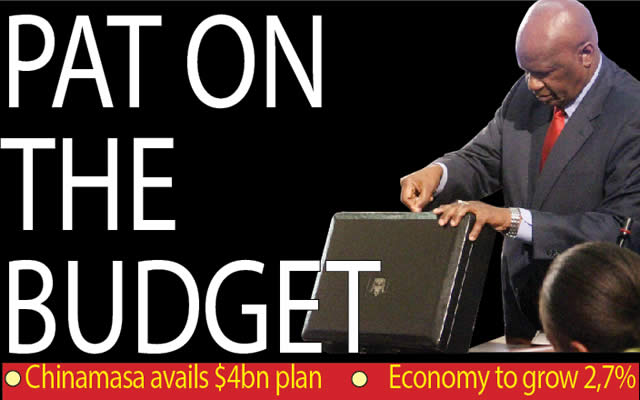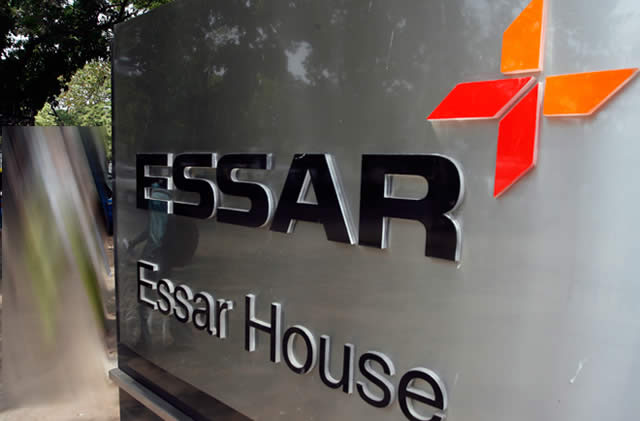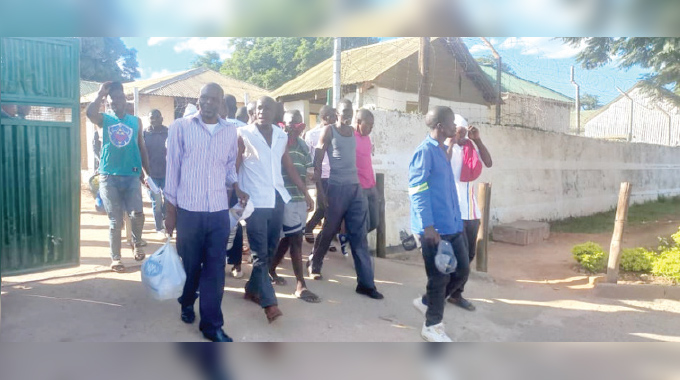PAT ON THE BUDGET…Chinamasa avails $4bn plan…Economy to grow 2,7%

 Prosper Ndlovu and Nduduzo Tshuma Business Reporters—
Prosper Ndlovu and Nduduzo Tshuma Business Reporters—
FINANCE Minister Patrick Chinamasa yesterday unveiled a $4 billion budget for 2016 containing a raft of fiscal policy measures aimed at attracting increased investment and rejuvenating the economy. Chinamasa identified revitalising agriculture and its value chain in the context of climate change, consolidating gains made in the mining sector as well as boosting domestic manufacturing industry capacity utilisation and export competitiveness, as major priorities for next year’s budget.
“Consistent with our macro-economic framework, I propose a budget of $4 billion against projected revenues of $3,85 billion, which will result in a deficit of $150 million or minus 1,1 percent of GDP that would be funded largely through domestic borrowing,” Chinamasa said.
Related…………..
- All set for the Budget
- Editorial Comment: Chinamasa has his work cut out
- Govt targets to raise $3,85bn in 2016
- 2,7pc economic growth projected
- A Buy Zimbabwe word into the mid-term Budget
“The 2016 recurrent expenditure budget is expected at $3,6 billion representing 92,1 percent of the budget,” said Chinamasa. He quickly admitted that the high level of recurrent expenditure in the form of employment costs coupled with tight liquidity conditions and limited access to international capital would constrain short term capital expenditure, which he projected at $315 million or 7,9 percent of the total budget.
Chinamasa expressed hope for the future as he urged collective efforts in implementing a number of economic reforms towards mitigating prevailing constraints.
“The economy is projected to grow by 2,7 percent in 2016 from 1,5 percent this year. Almost all sectors are expected to register a reasonable growth of between 1,3 percent and 4,5 percent. In order to catch up for the lost time, we need higher economic growth rates,” said Chinamasa.
He said exports were projected to clock $3,7 billion from $3,4 billion in 2015 on the back of anticipated favourable performance of minerals such as gold and chrome as well as growth in tobacco and horticultural products output. Imports, meanwhile, are seen declining marginally from $6,3 billion in 2015 to $6,2 billion.
The minister said inflation will generally remain subdued in 2016 at an average -1,6 percent reflecting a combination of continuous price correction, weak aggregate demand, tight liquidity conditions and competitive pressures arising from the weakening of the South African rand against the United States dollar.
He said the thrust of the 2016 fiscal policy statement was to consolidate investment processes anchored on the on-going international re-engagement programme and commitment to clearing internal and external country debt estimated at about $10 billion by June next year.
The two education ministries got the largest share of the budget with $810 million, while home affairs received the second largest vote of $396 million and defence $357 million. The health sector also got a modest allocation of $330 million, although falling short of the recommended 15 percent of the total budget by the Abuja Declaration.
Chinamasa said streamlining the wage bill, which is expected to chew $3,9 billion in 2016, would mainly target youth officers, agricultural extension workers, non-payment of salaries to teachers at non-government schools and reduction of student teacher allowances.
The measures are set to save about $14.2 million monthly or $170 million annually. He, however, skirted the issues of civil servants bonuses and taxable income threshold, both a common feature of past budgets.
He allocated $482 million for energy generation projects to address power shortages that are undermining economic activity, as well as provision of basic social services in the country. Chinamasa also proposed $299.3 million for Information Communication Technology backbone infrastructure, followed by $133.8 million towards transport infrastructure.
Admitting that recovery requires substantial funding, the Finance Minister said Zimbabwe would take advantage of the increasingly positive international sentiment to lure investment.
In response to the declining commodity prices, which continue to weigh heavily on mineral exports, Chinamasa said increased focus in 2016 would be directed to value addition and beneficiation. The measures are expected to narrow the competiveness gap and boost production domestic production across major economic sectors
On agriculture, Chinamasa said appropriate policies, efficient institutions and systems were essential to counter the effects of climate change to ensure a successful 2015/16 agricultural season.
He said the 2015/16 season has a target of 2,1 million hectares for grain crops with a budgetary requirement of $1,7 billion. The financing of agriculture would be through banking sector support under the coordination of the Reserve Bank of Zimbabwe, which has set aside about $1 billion.
He said the RBZ has already announced its readiness to facilitate additional financial facilities under which commercial banks will identify productive anchor farmers who will be targeted to enhance support and recapitalisation at affordable interest rates.
Chinamasa said contracts for contract farming for 2015/16 valued at $392,9 million have since been concluded. He reported the government has cleared all its arrears to farmers for maize and grain deliveries.
Chinamasa said $28 million has been allocated under the Presidential Agricultural Support Inputs Scheme targeting 300,000 vulnerable households.
The government took over Cottco to restore its role in the cotton industry value chain that benefits more than 300,000 small holder farmers in rural communities around the Gokwe, Sanyati, Rushinga and Chisumbanje areas. Chinamasa said $25,8 million had been allocated for the cotton input financing scheme targeting 250,00 hectares in the current systems.
He said the government would be giving free inputs for the cotton farmers for the next three seasons in order to encourage farmers to return to cotton production. Chinamasa said there are also contract farming arrangements targeting 255,000 hectares that will benefit 157,000 growers.
Fiscal incentives for incremental exports of horticultural products would be given while the government seeks to increase soya bean production from below 60,000 tonnes to about 240,000 tonnes. Chinamasa said banks have so far availed $25 million towards soya bean production for the 2015/16 season.
He said a $98,6 million loan facility was secured by President Mugabe from the Brazilian government for machinery targeting 21,136 small holder A1 and communal farmers on 178 irrigation schemes across the country’s various provinces.
The minister said by the end of October, equipment worth $32,8 million had been received and distributed to all provinces on a cost recovery basis.
He said the government was targeting 11,290 hectares of irrigable land that would benefit 3,890 households throughout the country with an allocation of $7 million from the budget and $8,6 million from development partners.
Chinamasa also revealed plans to invest $2,1 billion towards setting up gas mines, power stations and dams in the Gwayi-Lupane areas. A coal bed methane gas project there would generate about 300 megawatts of electricity.











Comments